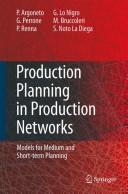| Listing 1 - 6 of 6 |
Sort by
|
Book
ISBN: 9781466620988 Year: 2013 Publisher: Hershey, PA : Engineering Science Reference ;,
Abstract | Keywords | Export | Availability | Bookmark
 Loading...
Loading...Choose an application
- Reference Manager
- EndNote
- RefWorks (Direct export to RefWorks)
Digital
ISBN: 9780857297075 Year: 2011 Publisher: London Springer London
Abstract | Keywords | Export | Availability | Bookmark
 Loading...
Loading...Choose an application
- Reference Manager
- EndNote
- RefWorks (Direct export to RefWorks)
Industrial economics --- Operational research. Game theory --- Production management --- Information systems --- ICT (informatie- en communicatietechnieken) --- bedrijfsplanning --- bedrijfsorganisatie --- informatiesystemen --- speltheorie --- industriële marketing --- ingenieurswetenschappen

ISBN: 1281103209 9786611103200 1402031521 1402031513 9048168090 Year: 2005 Publisher: Dordrecht : Springer,
Abstract | Keywords | Export | Availability | Bookmark
 Loading...
Loading...Choose an application
- Reference Manager
- EndNote
- RefWorks (Direct export to RefWorks)
The “extended enterprise” is a new emerging paradigm in the manufacturing arena. Indeed, global competition is pushing manufacturing enterprises in several industries either to split geographically the production capacity or to work together in supply chain organizations involving several independent entities. This dynamic is involving both big companies, whose organisation is always more and more decentralised and geographically distributed, and Small and Medium Enterprises (SMEs) that are embracing new organisation forms such as the Virtual Enterprise (VE) one. The “extended enterprise” allows gaining agility, reactive ness, even p- activeness, and, of course, efficiency in the highly dynamic markets of the mass customisation and knowledge based economy era. However, the “extended enterprise” paradigm scales management complexity both at the strategic and operational level up. This requires new tools for managing the complexity of the extended enterprise. The Information and Communication Technology (ICT) enables the possibility to create new and innovative “tools for managing the extended enterprise”. This book addresses the above introduced issue of the tools for the extended enterprise. More specifically, it presents the results of a research developed under a two years program titled “ “Distributed process and production planning in manufacturing enterprise networks” and funded by the Italian Ministry of Education, University and Research (MIUR) under the program PRIN2001.
Telemarketing. --- Electronic marketing --- Telephone marketing --- Direct marketing --- Telematics --- Telephone selling --- Engineering economy. --- Engineering. --- Engineering Economics, Organization, Logistics, Marketing. --- Facility Management. --- Construction --- Industrial arts --- Technology --- Economy, Engineering --- Engineering economics --- Industrial engineering --- Engineering economics. --- Facility management. --- Facilities management --- Factory management --- Plant engineering
Book
ISBN: 9780857297075 Year: 2011 Publisher: London Springer London
Abstract | Keywords | Export | Availability | Bookmark
 Loading...
Loading...Choose an application
- Reference Manager
- EndNote
- RefWorks (Direct export to RefWorks)
The manufacturing industry is facing the challenges of shifting its operations from the traditional factory integration philosophy to a supply chain based e-factory philosophy, and of transforming the focus of companies from the local factory to global enterprise and business. Innovative Tools for Business Coalitions in B2B Applications presents a set of innovative methodologies that can be used to face all the issues that stem from the interaction of customers and suppliers in an e-marketplace environment. The first methodology discussed is multi-agent architecture and this forms the basis of a simulation environment developed in order to test the proposed models. The second concerns a bargaining model based on the negotiation mechanism and the third centers on production planning to support agents during the bargaining phase. The fourth is the possibility of a coalition between the suppliers and the authors offer a choice of two different approaches. One is the application of Nash equilibrium to select the members of a potential coalition of sellers, while the other is a centralized approach with a profit sharing mechanism based on the Shapley value. All the innovative approaches reported in Innovative Tools for Business Coalitions in B2B Applications have been statistically tested in different market conditions. The methodologies, approaches and results presented in Innovative Tools for Business Coalitions in B2B Applications will be of interest to PhD students, operations managers and supply chain management researchers who develop value-added services for an e-marketplace in a business-to-business environment.
Industrial economics --- Operational research. Game theory --- Production management --- Information systems --- ICT (informatie- en communicatietechnieken) --- bedrijfsplanning --- bedrijfsorganisatie --- informatiesystemen --- speltheorie --- industriële marketing --- ingenieurswetenschappen


ISBN: 9781848000582 Year: 2008 Publisher: London Springer London
Abstract | Keywords | Export | Availability | Bookmark
 Loading...
Loading...Choose an application
- Reference Manager
- EndNote
- RefWorks (Direct export to RefWorks)
Distributed production networks are structures which are considered able to provide the organisational agility and efficiency necessary to compete in the global market. The performance of such organisations heavily depends on the ability of those involved in the network to coordinate their activities. Two approaches are available for managing complex distributed production networks: a centralised approach, where a unique entity (the planner, for instance) has all the necessary information to make planning decisions for the entire network; or a decentralised approach where each entity in the network has the necessary information and knowledge to make autonomous planning decisions, while the common goal is reached through cooperation between all the people involved in the network. Production Planning in Production Networks addresses production planning problems in distributed manufacturing networks from strategic, tactical, organisational and operative perspectives. New methodologies for capacity negotiation, allocation and workload assignment in production networks are presented. Specifically, three main problems are focussed on: how to negotiate production capacity availability in the long-term; how to allocate production capacity in medium-term planning; and, how to assign workloads in the short-term. The proposed approaches are based on negotiation algorithms in multi-agent networks. These approaches are compared with classical centralised approaches using discrete event simulation methodologies. Benchmark analysis is provided to understand the effectiveness and efficiency of the proposed approaches. The methodologies, approaches and results presented in Production Planning in Production Networks will be of interest to production network managers who will learn how to organise decentralised production planning in distributed organisations, and enterprise resource planning vendors who can apply the proposed methodologies to the extended enterprise.
Industrial economics --- Plant and equipment --- Production management --- Programming --- Artificial intelligence. Robotics. Simulation. Graphics --- productieorganisatie --- logistiek --- industriële marketing --- machines --- ingenieurswetenschappen --- CAD (computer aided design)


ISBN: 9781848000582 Year: 2008 Publisher: London Springer-Verlag London Limited
Abstract | Keywords | Export | Availability | Bookmark
 Loading...
Loading...Choose an application
- Reference Manager
- EndNote
- RefWorks (Direct export to RefWorks)
Industrial economics --- Plant and equipment --- Production management --- Programming --- Artificial intelligence. Robotics. Simulation. Graphics --- productieorganisatie --- logistiek --- industriële marketing --- machines --- ingenieurswetenschappen --- CAD (computer aided design)
| Listing 1 - 6 of 6 |
Sort by
|

 Search
Search Feedback
Feedback About UniCat
About UniCat  Help
Help News
News